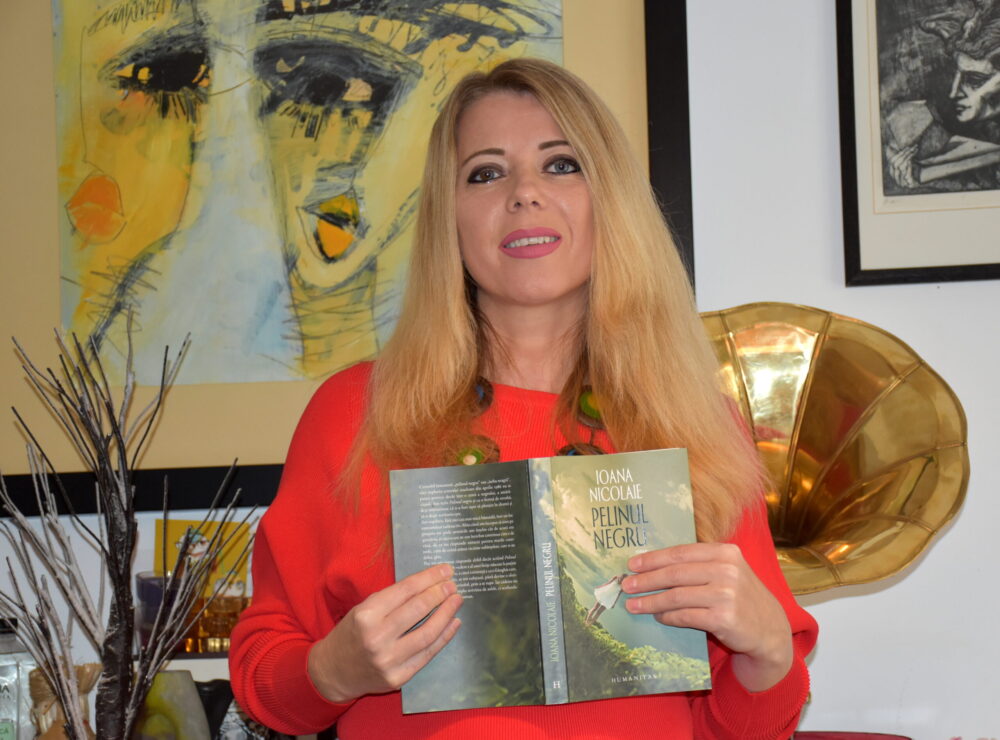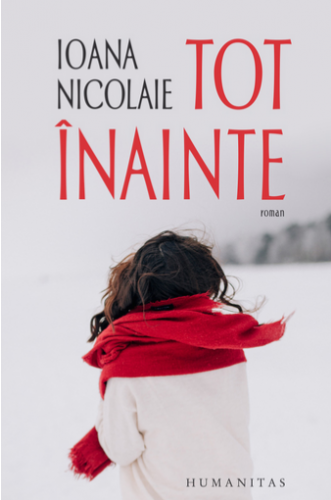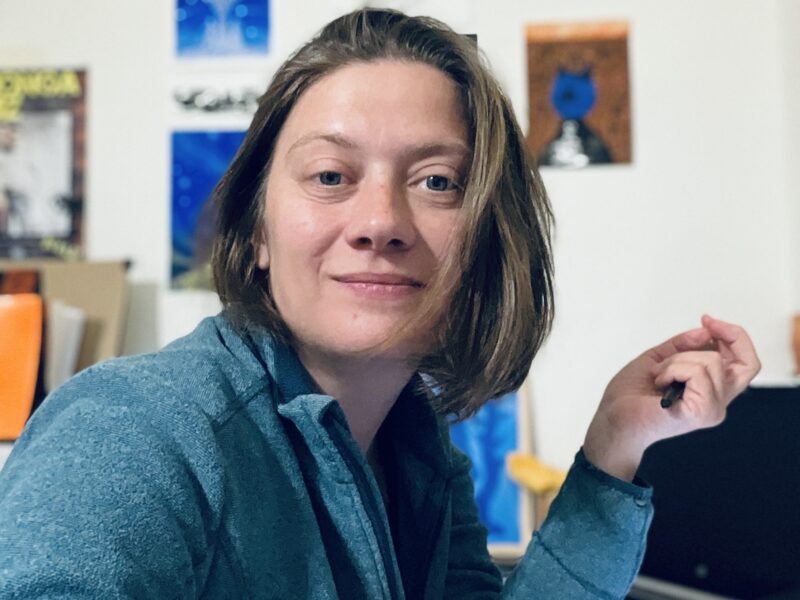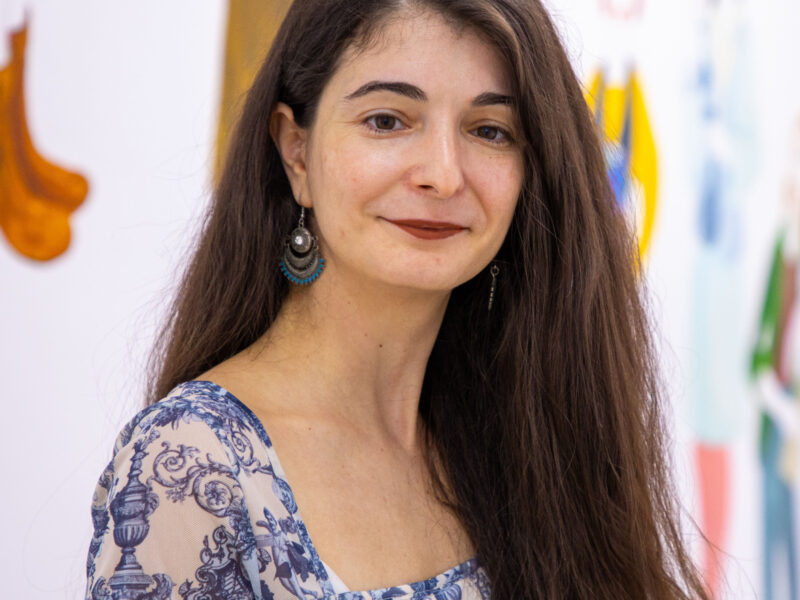The interview was made by Cosmin Divile after winning the Big Prize of the panel of Modern and Contemporary Romanian Literature at BEST Letters Colloquia, 8th Edition (Faculty of Letters – University of Bucharest, 29-30 of October 2021)
Ioana Nicolaie is born in Sângeorz-Băi, Bistriţa-Năsăud county, Romania. She is the author of several volumes of poetry (Poză retuşată, Nordul, Credința, Cenotaf, Autoimunan anthology ( Lomografii, five novels (Cerul din burtă, O pasăre pe sârmă, Pelinul negru, Cartea Reghinei and Tot înainte) and several volumes of children’s literature (Aventurile lui Arik, Arik și mercenarii, Ferbonia, Vertijia, Călătoria lui Medilo, Spionul KME and, using the pseudonym Robert Ersten, Cum am supraviețuit clasei a VIII-a and Cum să spui te iubesc). She was nominated for several international prizes, among which the Eastern European Literature Award. Nordul was translated in German (2008), Cerul din burtă was published in Swedish (2013), Bulgarian (2014) and German (2018), O pasăre pe sârmă was translated in Serbian, Autoimun was published in Bulgarian (2016), and Ferbonia was published in North Macedonia. Selected poems have been translated into French, English, German, Swedish, Polish, and Bulgarian. She is a member of the Romanian Writers’ Union and of PEN Romania.
Which have been the difficulties, obstacles and limitations regarding the recovery of the infantile perspective at the time of writing the novel Tot înainte?
They could have been much bigger if the atypical „narrator’s bet” hadn’t existed in my previous novels. In Pelinul negru, for example, the whole story is told by a little girl, Agustina, who is marginal in many ways: she is a child born after Chernobyl, she escapes death in her very first year, she has to repeat school years several times, and half of the story takes place in an orphanage. How can such a child tell such a complicated story, which she cannot comprehend nor understand? Well, when I finished the book, I couldn’t believe that I had managed to let only her speak. Then, in Cartea Reghinei it was even more difficult, because the narrator is a woman who, after multiple strokes, paralyzed and without a real voice, begins to narrate her life. In Tot înainte all I had to do was remove some of the layers of life and go down into my own life, the one from far away, trapped in the childhood amber. Once there, I started to tell stories. There was no need for who knows what kind of fictionalization, because things, no matter how incredible it may seem, did happen like that. The teacher was actually pulling out our teeth, in the photography course we took pictures without any photographic film, in the workshop practice we “worked” without materials.
When did you think of writing the novel Tot înainte? Which of the following themes has given you the most “headaches”: communism or childhood / adolescence?
I always knew that there would come a time when I would tell what I experienced in communism, but I did not suspect that this would happen after two other novels that seemed obligatory to me to write, Reghina’s and Augustine’s. That in the end they can be seen as three mirrors facing one world is another surprise to me. In this Trilogy of the North, as it was called by the critics, there are three of the stories of Bulța family: the mother’s, Reghina; the dying girl’s, Agustina; and of the girl who only knows how to listen, Arsenia. All these books were necessary and overwhelming for me, because I am their witness. And this witness knows many other things that she would like to have the time and strength to say.
Your novel is the most recent in the series of stories about childhood / adolescence from communism in contemporary Romanian literature. Is there a title in this series that you particularly enjoyed?
I don’t see my books as trapped in a series outside of me, because they’re organic, they are part of my fictional body with its masks – for I also write children's literature –-, with its obsessions, despairs, but especially with the little I have managed to bring so far into the world. Most books, unfortunately, never end up being written. In my case, this has always been caused by lack of time. I work and struggle to find those hours in which to just write. As for the books I like, not the theme, but the literature in them, the art, the writing power are what always matter. However, I shall name two titles: Tinerețile lui Daniel Abagiu by Cezar Paul-Bădeascu and Toți copiii librăresei by Veronica D. Niculescu.
Există scriitori/scriitoare – fie că vorbim de literatura română, fie de cea universală – care v-au inspirat în privința recuperării perspectivei infantile și a temei copilăriei / adolescenței?
They didn’t inspire me per se, they just showed me how fantastic the faces of literature are. It is hard to create children characters. So I love the poetic way in which Aglaja Veteranyi recovers her biography, I am amazed by Benji, the wonderful idiot proposed by Faulkner, by the strange adult child from Ferdydurke, I am very moved by the Mentardy or by the unparalleled girls from “REM“, I am really keen on the voice of To Kill a Mockingbird etc.
The novel is dedicated to your son - after an anecdote that also appears in the book, answering his curiosity about what communism meant. Therefore, did you have a certain target audience when you wrote the novel?
Tot înainte is an extended answer to several questions: what was communism like, what are the resorts of a political regime in which the human being does not matter, what is a dictatorship built on, what is manipulation, how do you psychologically change the new generations, what kind of education you offer them, how do you justify social inequity, what messianic-heroic projections do you graft on the idea of “people”, etc. Paradoxically, I did not set out to do all this, but it was enough to remember and stay as close to the truth as possible. Some leftists today, who lived in those days, are probably descendants of the regime’s profiteers. They were doing well. The others, not so much.
How did you feel about the reception of your novel? Do you usually read the reviews dedicated to your books?
I read the reviews and I thank those who write honestly about my poor little books, despite some contextual pressures. I respect those who express their reservation for an aesthetic perspective and organically detest the ideological approach of literature. All who supported dictatorships practiced the latter kind of reading. In our country, during 70sthe 50s, all kinds of little people, totally forgotten today, immediately crocheted their literary canon out of lies and advantages. In the obsessive decade the truly great writers were erased, just think of Arghezi. Censorship existed up to the fall of communism, and the ban under the guise of unpublishing was common. I find it embarrassing to return to such primitive approaches to art in the 21st century.
There are many objects and cultural products from the West in the novel, which Arsenia Bulța, the protagonist, associates with the privileges of the “children from the block”. What were the joys of your childhood?
Arsenia is five years old when the story of Tot înaintebegins. The happy children from the block are also a cliché of the time, because in the 70s80s there was an attempt to force the systematization of the villages. All of us saw the propaganda on TV about the good life in the apartments compared to the primitive life of the people who live in houses. The little girl has no tools to decode this lie, however, as she grows up, she points out the terrible cold in the apartments, the cruel poverty of those living in the blocks having no food whatsoever, the endless lines in which she stands for hours, and so on. In fact, not those who have a property, as is the case of Arsenia’s family, are suffering from hunger, but the rest, that is most people.
Behind every aspiration for Arsenia’s future there was, in fact, a Western object (Mickey Mouse handkerchief, jeans, Western music etc.). Is this a reflection of your perception of the world beyond borders? What kind of “stories” were circulating among children / teenagers about the “Beyond”? Was there a dichotomy between here and there in a child’s imagination?
In Tot înainte I'm actually making use of my biography, meaning the answers are there. Of course, there is much to add. The only jeans I saw when I was a child belonged to a relative of mine who had the huge privilege of being the daughter of some... shop managers (those who were selling stuff, especially the food sellers, had a very high authority at the time). Picture a totalitarian regime, like communism in our country, as a huge prison. Material scarcity is the rule, most products do not even exist - from toilet paper to ordinary cotton wool -, hygiene is often based on homemade soaps (made of caustic soda and animal fats), food is rationed and perpetually dwindling. I will never forget how the “eugenia” disappeared, that is, some poor stone-hard biscuits. And since prisons can also be escaped from, I knew people who managed to flee to Austria where they sought political asylum. How did they cross the border? Swimming across the Mureș River and dodging bullets. My older siblings, a girl and two boys, were each planning to leave.
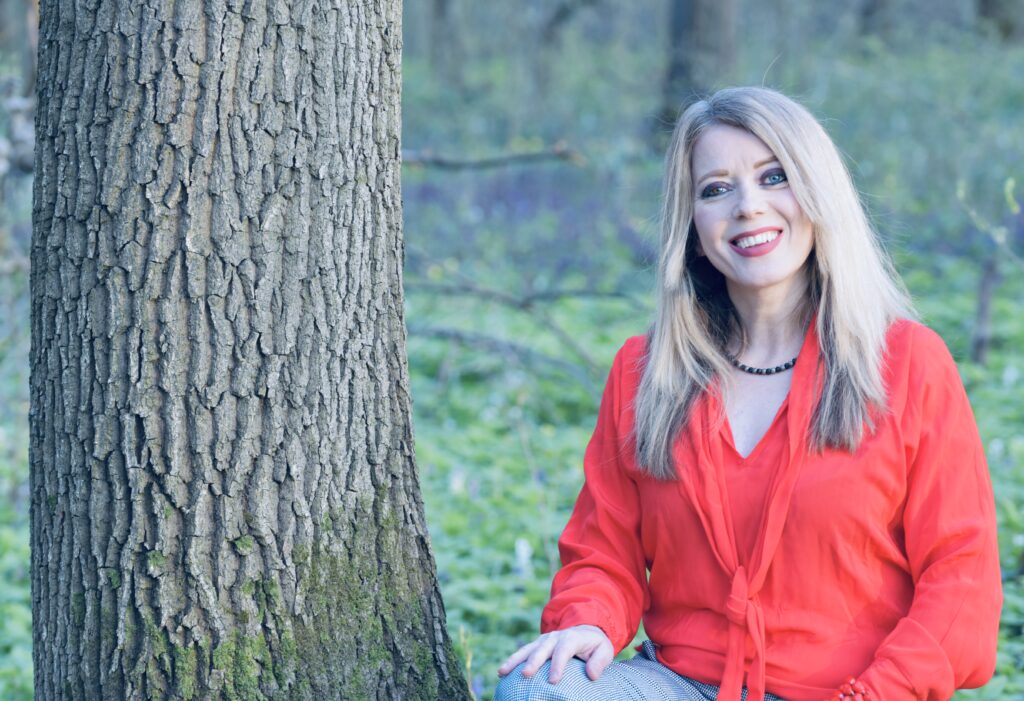
Throughout the novel, Arsenia Bulța nurtures several job aspirations (from school maid to dance teacher). Does she reflect a personal experience of yours? Did you dream of becoming a writer as a child / adolescent?
I’ve known since I was 8 that this is the path I want to take. Apparently, I’m a lucky one. I have always collected emotions, stories and a lot of images. Sometimes that was hard for me to bear, especially when I didn’t have time to write things down. (Of course, that doesn’t mean I didn’t want to be a photographer. And I also discovered that I had a talent for tailoring).
How old were you during the 1989 Revolution and what were you doing when it reached its climax? What did you think was happening in Romania at that time? How did you celebrate Christmas in 1989?
I was 15 years old, carolling in my North, with my group of teenagers sitting stone-still into a house. The execution of the Ceaușescu family was broadcast live on television. It was unreal, outside any possible reality, we were actually experiencing a traumatic shock. We were told that tens of thousands people had died, about the terrorists spreading around the country and shooting people, even poisoning the wells. This is how freedom entered Romania. My older brother had been in the group that had taken the dictator’s books out of the city library and set them on fire in the street. From him I learned about the flags with their coat of arms ripped away and about the fleeing of the mayor, a sinister activist woman.
The first two novels were published by Paralela 45 and Polirom publishing houses, followed by the next three published by Humanitas. Why this change?
It just happened, I had no plan in this sense. Until 2004, Polirom did not have a collection of Romanian prose. Nobody had such a thing. In fact, it was very difficult for young authors to publish. I won a debut contest to see my Poză retușată published – a martyr volume of poetry, halved at publication. The novels eventually reached their rightful place. I consider myself lucky to be published by Humanitas and that I have a wonderful editor, to whom I owe a lot, Lidia Bodea.
Have you received interest for your novel to be translated and published abroad?
No. And this discussion could last a long time. In short, an author who does not have an agent agent has no way to gain visibility abroad. And one more thing: a country that does not promote its authors also has no chance for its literature to exist abroad. If you don’t take care of your translators , you simply won’t have translators. And the few translators we have cannot be at the same time canon regulators, perfect critics, literary agents, PR specialists etc. They are not meant to be supermen of culture.
In two years, the Melior Foundation will be celebrating ten years of existence, during which time you have managed to set up a considerable number of school libraries for children from different areas of Romania. What is really missing: the books or those who should introduce children to the world of books? How does your childhood in communism resemble the realities you encountered during your “fieldwork” experience?
The Melior Foundation is a long story, I can’t believe it’s been 8 years since its inception. In the meantime, we have created 17 Melior Libraries, that means no fewer than 8000 books donated to schools or hospitals in the country. We have invested tens of thousands of euros in education, not to mention that I am paid with a minimum wage, and that for Melior I only volunteer. “Good” is made out of links, only one person cannot reach it. However, the fact that the energy comes mostly from a single mind is true. Sometimes I feel very tired, all I want is for such projects where I personally take books to schools to not be needed anymore. I have long demanded a law so that a library should exist wherever there are children; and this library should receive money through the Ministry of Education, not through town halls. And the book funds should be annually supplemented with the most beautiful volumes that appear. It is a great bit of bitterness - and shame - that our rulers imagine that they can raise children without reading books. And this happens in the third millennium, in the EU. Most of our children do not have access to books. Therefore, they have no future. As for comparing a childhood lived in a dictatorship with that of a free world, I don’t think it’s appropriate. It’s like putting freedom in prison on the same rank as ... freedom.
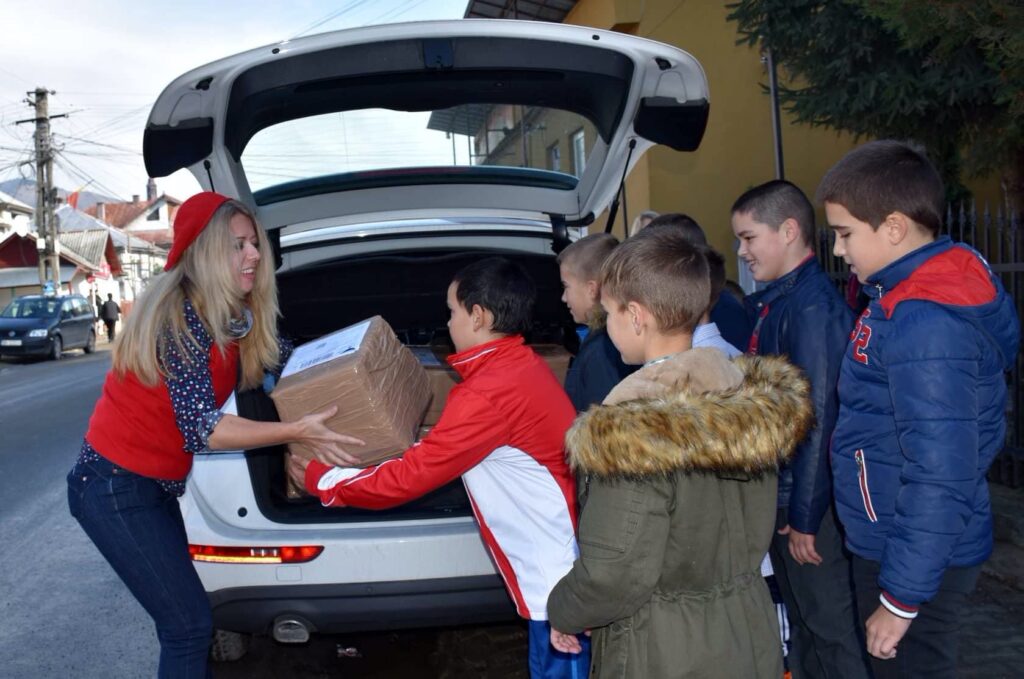
How do the children you visit through Melior react, considering that, most likely, it’s their first meeting with a living writer?
Every Melior project is a joy and an adventure. Children also take part in workshops of playing and imagination, they receive books as gifts, and are often amazed at how those books can look like. There were moments when they just threw themselves into my arms and told me that writers are the greatest people of all - and these were not primary school children. They would sometimes explain to me why they cannot read, “the second chance children”, who don’t even know how to speak Romanian well, because they use a Roma dialect at home. I saw many of them stunned with one book or another in their hands, in front of the shelves full of new, beautiful books, as they had never seen before. I have met many children who, although possessing phones and tablets, do not have any books at home. I always tell myself that our poor children are thrown into the future without any safety nets.
Have you considered continuing Arsenia's “story” in a post-communist context?
I partly wrote it in O pasăre pe sârmă. Furthermore, I would very much like a break to be able to write a novel that will be far remote from my Transylvanian world and only because it will take place mostly in Berlin. Until then, I hope that Miezul inimii, , a short story volume, will come out, as well as a new edition of Cerul din burtă, un roman-poem la care eu încă țin mult.
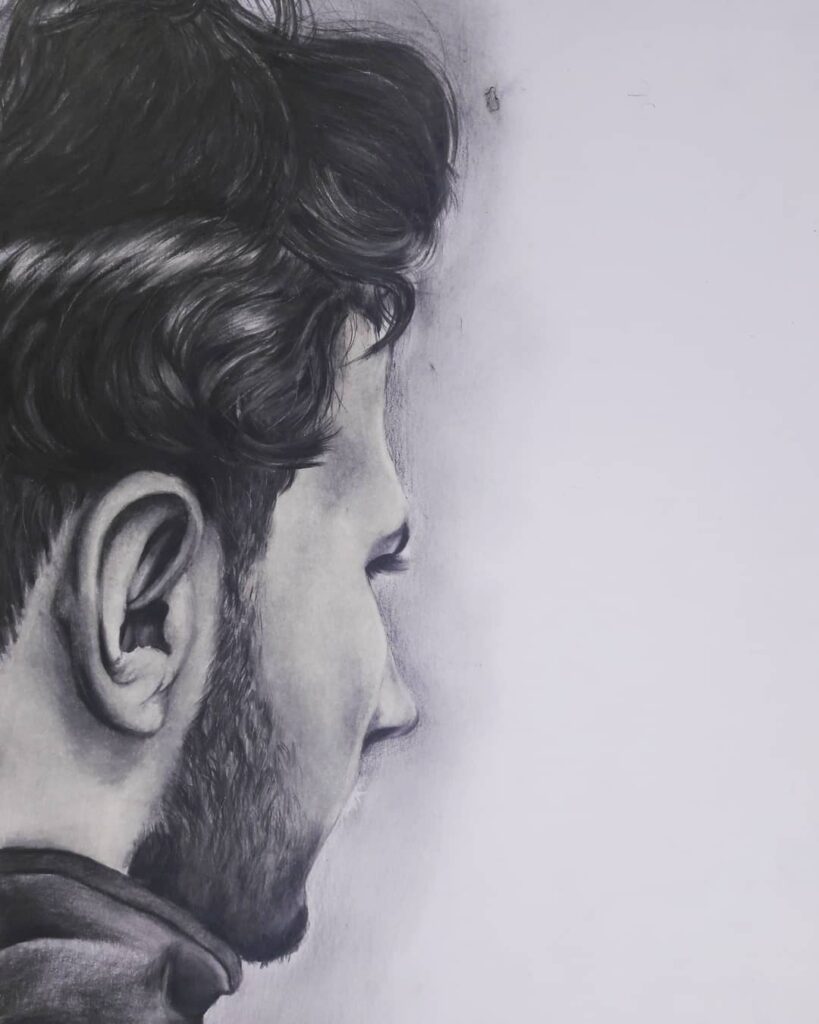
Divile Cosmin is born in Roman, Neamț county. He is a PhD student at the Doctoral School of Linguistic and Literary Studies (SDSLL), the Faculty of Letters, Babeș-Bolyai University in Cluj-Napoca. His doctoral thesis, coordinated by Professor Ioana Bican, PhD is entitled Romanian travel literature in a totalitarian context: from propaganda to aesthetic autonomy [Literatura de călătorie română în context totalitar: de la propagandă la autonomie estetică].He graduated from the Faculty of Theology with a thesis on the divine names used in the book of Genesis. He attained a BA from the Faculty of Letters with a paper on three novels written by F.M. Dostoevsky and an MA in Romanian Literary Studies with a dissertation about the contemporary Romanian novels dealing with childhood and adolescence during Communism.

